
-
 Auger-Aliassime belatedly beats Paul to reach Adelaide final
Auger-Aliassime belatedly beats Paul to reach Adelaide final
-
Lancet study estimates Gaza death toll 40% higher than recorded
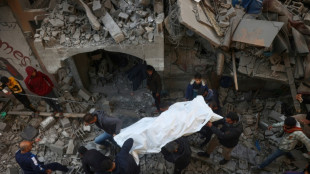
-
 South Korea's presidential security chief resigns
South Korea's presidential security chief resigns
-
Italian FM tours landmark mosque in first Syria visit

-
 'Apocalyptic': ghastly remains of Malibu come into focus
'Apocalyptic': ghastly remains of Malibu come into focus
-
Pakistan flight departs for Paris after EU ban lifted

-
 Nicolas Maduro: Venezuela's iron-fisted 'worker president'
Nicolas Maduro: Venezuela's iron-fisted 'worker president'
-
Ukraine's French-trained brigade rocked by scandal

-
 Venezuela's Maduro to take presidential oath despite domestic, global outcry
Venezuela's Maduro to take presidential oath despite domestic, global outcry
-
Red-hot Gauff vows to keep cool in Australian Open title charge

-
 Zverev says he has mindset to finally win Grand Slam in Melbourne
Zverev says he has mindset to finally win Grand Slam in Melbourne
-
Anti-war Russian theatre in Latvia fights language ban

-
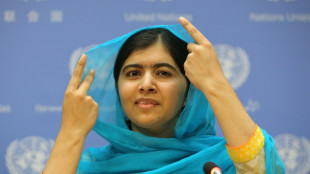 Nobel laureate Malala Yousafzai to visit native Pakistan for girls' summit
Nobel laureate Malala Yousafzai to visit native Pakistan for girls' summit
-
Shotgun watch: LA fire evacuees guard against looters

-
 Los Angeles fire deaths at 10 as National Guard called in
Los Angeles fire deaths at 10 as National Guard called in
-
'Control freak' Swiatek describes shock and 'chaos' over doping ban

-
 Vietnam jails ex-lawyer over Facebook posts
Vietnam jails ex-lawyer over Facebook posts
-
Sinner in dark over verdict as ATP says doping case 'run by the book'

-
 US President-elect Trump to be sentenced for hush money conviction
US President-elect Trump to be sentenced for hush money conviction
-
AI comes down from the cloud as chips get smarter

-
 Englishman Hall grabs share of Sony Open lead
Englishman Hall grabs share of Sony Open lead
-
Olympic champ Zheng says 'getting closer' to top-ranked Sabalenka

-
 Tajikistan bets on giant dam to solve electricity crisis
Tajikistan bets on giant dam to solve electricity crisis
-
Air tankers fight Los Angeles fires from frantic skies

-
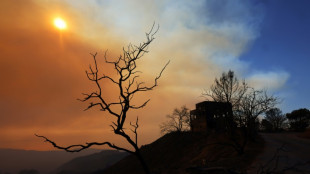 Right-wing disinformation targets DEI, 'liberal' policies as LA burns
Right-wing disinformation targets DEI, 'liberal' policies as LA burns
-
Osaka to play Australian Open after 'devastating' injury pullout

-
 'Disruptor' Medvedev ready to bring down Sinner and Alcaraz
'Disruptor' Medvedev ready to bring down Sinner and Alcaraz
-
Atletico can seize La Liga lead as Osasuna visit

-
 Navalny lawyers face long sentences in 'extremism' trial
Navalny lawyers face long sentences in 'extremism' trial
-
India's Kumbh Mela, world's largest religious gathering

-
 India readies for mammoth Hindu festival of 400 million pilgrims
India readies for mammoth Hindu festival of 400 million pilgrims
-
Uruguay bucks 2024 global warming trend
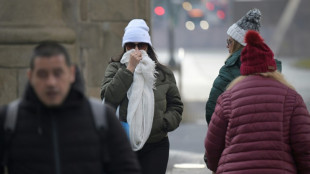
-
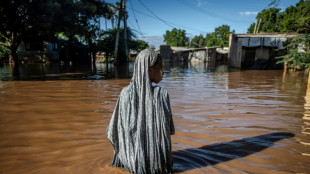 Last 2 years crossed 1.5C global warming limit: EU monitor
Last 2 years crossed 1.5C global warming limit: EU monitor
-
Asian markets drift lower as US jobs data looms

-
 Sabalenka has 'target on her back' in pursuit of Australian Open 'history'
Sabalenka has 'target on her back' in pursuit of Australian Open 'history'
-
Croatia's populist president tipped for re-election

-
 Veteran Monfils powers past teenager to reach 35th final
Veteran Monfils powers past teenager to reach 35th final
-
Japan 'poop master' gives back to nature

-
 UN watchdog says Australia violated asylum seekers' rights
UN watchdog says Australia violated asylum seekers' rights
-
Murray braced for Djokovic ire in coaching debut at Australian Open

-
 At CES, AI-powered garbage trucks reduce battery fire risk
At CES, AI-powered garbage trucks reduce battery fire risk
-
S. Korea presidential security chief urges 'no bloodshed' in Yoon arrest

-
 Combustible Kyrgios says tennis 'a bit mundane' without him
Combustible Kyrgios says tennis 'a bit mundane' without him
-
US Supreme Court to hear TikTok ban case
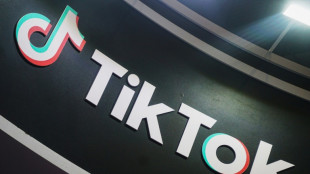
-
 Los Angeles Rams playoff game moved to Arizona over fires: NFL
Los Angeles Rams playoff game moved to Arizona over fires: NFL
-
Survivors patrol as looters prey on fire-wrecked Los Angeles

-
 US 'Pizzagate' conspiracy theory gunman killed by police: media
US 'Pizzagate' conspiracy theory gunman killed by police: media
-
ATP chief insists Sinner doping case 'run by the book'

-
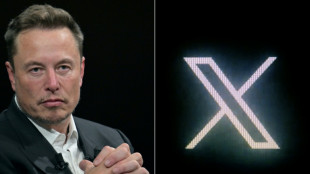 Musk promotes German far-right leader in latest European intervention
Musk promotes German far-right leader in latest European intervention
-
Inter Miami's Mascherano cools Neymar talk


Ceasefire in Israel-Hezbollah war to take effect
US President Joe Biden said a Lebanon truce will take effect early Wednesday, after Prime Minister Benjamin Netanyahu said a ceasefire with Hezbollah would allow Israel to focus its attention on Hamas and arch-enemy Iran.
The ceasefire will begin at 4:00 am local time (0200 GMT), Biden said, speaking at the White House after Netanyahu's office announced his ministers had approved the deal.
Ten ministers voted in favour and one against, the Israeli premier's office said.
The United States is Israel's key ally and military backer, and Biden hailed the deal as "good news" and a "new start" for Lebanon.
Netanyahu thanked Biden for his "involvement" in brokering the deal.
The United States, European Union, United Nations and G7 had all pushed for a halt to the fighting between Israel and Iran-backed Hezbollah after more than a year of cross-border fire and two months of all-out war in Lebanon.
Biden and French President Emmanuel Macron said the ceasefire will protect Israel from Hezbollah and create the conditions for a "lasting calm".
The United States and France will ensure the deal was "fully implemented", a joint statement said.
In a televised address ahead of his security cabinet vote, Netanyahu said: "The length of the ceasefire depends on what happens in Lebanon."
The announcement followed the heaviest day of raids on Beirut -- including a spate of strikes in the city's centre -- since Israel stepped up its air campaign in Lebanon in late September before sending in ground troops.
The raids continued after Netanyahu's address, with the central commercial district of Hamra coming under attack.
Pressure for Israel to accept a deal had been steadily mounting, with G7 foreign ministers on Tuesday calling for an "immediate ceasefire".
Lebanese Prime Minister Najib Mikati, after demanding that the international community "act swiftly" to ensure the truce's immediate implementation, said he was committed to strengthening the army presence in the south.
He called the truce a "fundamental step" towards stability.
Biden said the deal was designed to be a "permanent cessation of hostilities" between Israel and Iran-backed Hezbollah.
Under the agreement, the Lebanese army would take control of the border area on their side and "what is left of Hezbollah and other terrorist organisations will not be allowed... to threaten the security of Israel again," he said.
The United States and France would ensure the deal was fully implemented but there would be no US troops on the ground, he added.
Netanyahu said in his speech that Israel would maintain "full" freedom to act, even after the ceasefire.
He said a truce would also permit Israel to redirect its efforts back to Gaza, where it has been at war with Hezbollah ally Hamas since October of last year.
"When Hezbollah is out of the picture, Hamas is left alone in the fight. Our pressure on it will intensify," he said.
The agreement would also enable "focusing on the Iranian threat" and give Israel's military time to resupply, he added.
Iran is the main backer of both Hezbollah and Hamas, as well as other regional proxies that profess to be at war with Israel.
Iran itself has fired two barrages of missiles and drones at Israel since the Gaza war began, most of which were intercepted by Israel or its allies.
A ceasefire has faced some opposition from within Netanyahu's own coalition, with far-right National Security Minister Itamar Ben Gvir warning it would be a "historic missed opportunity to eradicate Hezbollah".
The results of a flash poll by Israel's Channel 12 showed that based on their understanding of the ceasefire proposal, 37 percent of Israelis support the deal, 32 percent oppose it and 31 percent said they were unsure.
- 'Belt of fire' -
Netanyahu's announcement followed a flurry of strikes on central Beirut as well as on Hezbollah's bastion in the southern suburbs.
Lebanon's state-run National News Agency reported that three strikes hit the central Nweiri neighbourhood and destroyed a "four-storey building housing displaced people". The health ministry said the first strike killed seven people and wounded 37.
"We were blown away and the walls fell on top of us," said Rola Jaafar, who lives in the building opposite.
Hezbollah lawmaker Amin Sherri, speaking to reporters at the scene of the first Nweiri strike, accused Israel of "seeking revenge on supporters of the resistance and on all Lebanese" ahead of a ceasefire.
Israel's military warned residents of four neighbourhoods of central Beirut to evacuate, the first such warnings it had issued for the city centre since war escalated in September.
One strike hit the popular shopping district of Hamra, minutes after Netanyahu's speech.
The NNA said Israeli strikes had created "a belt of fire" Tuesday around Beirut's southern suburbs.
The Israeli military said it had attacked Hezbollah targets in Beirut, including "components of Hezbollah's financial system", as well as many others in south Lebanon.
Its troops had also "engaged in close-quarters combat with terrorists" and destroyed hidden weapons caches during raids in the Litani River region.
- 'Serious mistake' -
The war in Lebanon escalated after nearly a year of limited cross-border exchanges of fire begun by Hezbollah.
The Lebanese group said it was acting in support of Hamas after the Palestinian group's October 7, 2023 attack on Israel, which sparked the war in Gaza.
Lebanon says at least 3,823 people have been killed in the country since October 2023, most of them in the past several weeks.
On the Israeli side, the hostilities with Hezbollah have killed at least 82 soldiers and 47 civilians, authorities say.
The initial exchanges forced tens of thousands of Israelis from their homes, and Israeli officials have said they are fighting so they can return safely.
Some northern residents questioned whether that would be possible under a ceasefire.
"In my opinion, it would be a serious mistake to sign an agreement as long as Hezbollah has not been completely eliminated," said Maryam Younnes, 29, a student from Maalot-Tarshiha.
Some demonstrators gathered outside Israel's defence ministry in Tel Aviv on Tuesday evening to protest against a ceasefire.
- School hit in Gaza -
Sustained efforts this year by mediators to secure a truce and hostage-release deal in the Gaza war have failed.
But US Secretary of State Antony Blinken suggested that a Lebanon ceasefire could change that, telling reporters that "by de-escalating tensions in the region, it can also help us to end the conflict in Gaza".
The civil defence agency in the devastated Palestinian territory said Tuesday 22 people were killed in Israeli shelling and strikes, including 11 killed in an attack on a school housing the displaced.
Hamas's October 7 attack on Israel last year resulted in the deaths of 1,207 people, most of them civilians, according to an AFP tally of Israeli official figures.
Israel's retaliatory campaign has killed 44,249 people in Gaza, according to figures from the Hamas-run territory's health ministry that the United Nations considers reliable.
burs-srm/ser
F.Moura--PC
